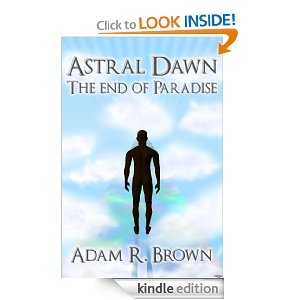Review: Astral Dawn: The End of Paradise
by Fran Laniado
If anyone were to ask Caspian Knoll what he was doing with his life, he’d probably have tough time coming up with an answer. At twenty-two he works a low paying dead end job, and lives with his parents. His idea of an exciting weekend involves something good on TV, and he’s never had a real girlfriend. That’s not to say Caspian is “a loser”. Quite the contrary. He’s basically a decent guy.
He is intelligent and inquisitive. He wants more out of life. But he isn’t quite sure how to get beyond “wanting” it. He’s held back by a general sense of fear and anxiety. Of course he doesn’t seem like the type of person to save a heavenly realm from invasion. But are the people who save other worlds ever, really, the people that you would expect?
One Friday evening, Caspian picks up an interesting looking Ankh necklace when he stops into an antique store on his way home from work. Other than that nothing else remotely atypical happens, and Caspian goes home, has some dinner with his family, watches some television and falls asleep. He awakens in a strange Heavenly realm. He’s taken to places with names like the Clear Path, Inspiration’s Light and the Way of Ascension before his arrival in the Celestial City.
Here he finds a guide who tells him that a) he is dreaming (he kind of figured that one out on his own) b) This is somehow different from a normal dream c) He’s in what humans traditionally think of as Heaven and d) He’s not actually dead- just visiting. All seems well in the Celestial City, as you might expect. But Caspian begins to notice some folks around that look like they don’t belong in Heaven. In fact, they look like they belong somewhere a bit further south… But for some reason, Caspian is the only one who can see them. It comes to pass that Caspian might be the only thing stranding between Paradise, and an invasion.
Like any other book, Astral Dawn: The End of Paradise has its share of strengths and weaknesses. Impatient readers be warned that some of the weaknesses appear first. We get a preface and a prologue that are set in realms that we can assume are Heaven and Hell, but without really having an idea of who these beings really are, or the stakes, it’s hard for the reader to engage, or even understand. Push though this.
Once we meet Caspian things start to look up. He has found himself in a similar situation to a lot of other “new adults”. He’s been told that he may have to pay his dues but eventually if he tows the line he’ll have a good job, a family, and a happy fulfilling life. But he’s not sure how to get from point A to point B. He sends out resumes, but not much seems to come of them.
When he sees a girl who catches his interest, he can’t think of anything to say to her. A lot of readers may sympathize with Caspian in this, because it’s a point in life that’s very similar to where a lot of readers either are of have been once: the point where we once assumed that everything would come together, only to learn that it’s not that easy. As a sympathetic and realistic character, he gives the reader a firm foundation in the familiar. Therefore when he starts to encounter realms that are more fantastical, he needs the same explanations that the reader does, in order to understand what is happening. He also gives the reader something firm and familiar to hold onto, in spite of some of the more bizarre goings on.
Things do get weird. We are essentially taken on a guided tour of Heaven here. We learn a lot of “rules” for travel, fighting, and communicating in this new realm. There is are hints along the way, that Caspian’s journey is not yet through by the end of this book, and will be continued in a sequel. There are plenty of loose ends at the finish of this book, but that’s alright as long as they are tied up in later installments.
Author, Adam R. Brown, also deserves credit for setting his novel in a multicultural world. Well, technically two multicultural worlds. He rarely dwells on a character’s race unless it has some relevance to the plot or characterization- which occasionally it does. In his character descriptions he’ll mention that a beautiful woman appears to be of Hispanic descent. We learn that Caspian is African American early on via a few off hand comments, but his race doesn’t define him. There’s a sense of balance in Brown’s depiction of race and culture. It is a part of who his characters are, and sometimes why they act a certain way, but it is never their defining characteristic. This balance is refreshing in fiction, where often all characters are given the same cultural background as the author and/or the intended audience.
Overall, Paradise as seen in Brown’s novel is a vividly created world that is not always what you’d expect of Heaven. No angels playing harps on clouds here! It is the way that the novel subverts our expectations and ideas about Heaven and Hell that make this an interesting read.
Fran Laniado is a recurring writer for Synchronized Chaos, from New York, NY. She may be reached at fl827@hotmail.com


Pingback: Synchronized Chaos January 2014 – Scouting Parties | Synchronized Chaos